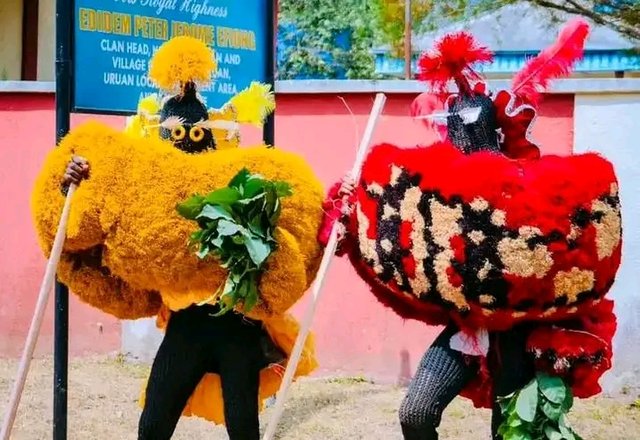The Sad Fading Away of the Rich Ibibio Proverbs and Idiomatic Expressions
In our today’s world, it is such a pity that these once-revered treasures are gradually fading away, almost unnoticed. What was once the pride of elders, the glue of community conversations, and the moral compass of generations is now becoming a memory, rarely heard and even more rarely understood. The modernized world and the Western civilization has taken over the rich culture and way of life of the African. More domestic violence, broken marriages, disregard to the elders and lot of social vices.
The Ibibio's were known for their rich proverbs, which were more than just a words. They are poetic capsules of truth, reflections of communal experiences, and tools of persuasion and correction. For instance, a proverb like "kudot eyen ke ofongidem akpamkpa, baha amidukeme", meaning “One shouldnt places his or her hope on the properties of the dead Incase it doesn't size you”, this Proverbs teaches about not having hope on someone but instead, one should be responsible, hardworking and acquired his or her own wealth. Such expressions often held deeper meanings and were used to subtly pass advice and correct behaviors.
Another example is , "Eyen ubuene ase okob ekpat ke nte ubok eseme." Meaning, a poor child should always hang his or her bag where his or her hand reaches"
This teaches that " One should live within their means and avoid striving for things beyond their financial or social capacity".
These were rich sources of advice and teachings all In one action and word.
Now the question is; Where are we now?. Sadly, we are losing these invaluable tools of communications and also their place in society.
The younger generation, influenced by Western culture and digital communication, now grow up speaking mostly English or Pidgin. Parents no longer pass down these sayings as part of daily conversation.
FOLK SONG |
|---|
Another rich Akwa ibom Proverbs were most times put into songs, now called " folk songs".
Folk songs/forktale have long stood as powerful vessels of history, wisdom, emotion, and communal identity. Far beyond mere entertainment, Ibibio folk songs reflect the values, struggles, celebrations, and philosophies of a people deeply rooted in their land and belief systems. Today, as we witness a shift in cultural expressions due to modernization, it becomes even more important to reflect on the true value of these traditional songs.
Ibibio folk songs are not random chants. Each lyric carries layers of meaning. Whether sung during festivals, funerals, marriage ceremonies, farming, or moonlight plays, these songs always reflect something greater the worldview of the Ibibio people.
This folk song I am presenting first teaches the importance of showing gratitude to God the creator of everything, greeting and showing respect to elders. After the greeting, the song tells a story about a bird that cries at night because the forest is frightening. However, when the bird was given the opportunity to live closer to people, it turned into a devouring fowl. As a result, it is now called a 'fowl stealer.
MORAL LESSON |
|---|
This song hold a powerful message and warning , that one should be careful when rendering help to someone seeking for here. Here is the wisdom in the song.
- Respect and Greeting of Elders:
The opening of the song emphasizes that respect begins with simple acts like greeting elders. This sets the tone for good behavior and humility in a community.
- The Bird’s Cry in the Forest:
The bird symbolizes someone in hardship or isolation. Its crying at night reflects a plea for help, attention, or mercy due to its difficult situation.
- Being Brought Closer to People:
The bird is given a chance brought out of hardship (the scary forest) and brought into a safer, better place (near people). This represents an opportunity, grace, or a second chance.
- Turning into a 'Devouring Fowl':
Instead of appreciating the help, the bird misuses the opportunity and becomes destructive. This shows betrayal of trust, ingratitude, and abuse of kindness.
- Called a 'Fowl Stealer':
The community now labels the bird for its wrongdoing, showing that actions have consequences, and a person’s name or reputation changes based on their behavior.
Conclusion: |
|---|
The need of reigniting the use of idiomatic expressions in our Ibibio culture is not just a call to preserve language, but a call to revive our identity, values, and ancestral wisdom. These expressions carry deep meanings that teach morals, guide behavior, and connect generations. If we lose them, we lose a vital part of who we are as a people. Therefore, every effort to bring them back through storytelling, music, education, or creative challenges is a step toward keeping the soul of the Ibibio culture alive for generations to come.
I really appreciate you all for reading through this post , thank you.
[Photo credit to Joe-maria]








I must applaud you for this strong and great message and reminder you put up in this writing. It is a fact that Africa are losing its cultural heritage not only in Proverbs but also in way of life. We call it civilization, yeah civilization is good but sometimes influences some of our unique way of doing things that promoted unity and foster peace among us. Our elders especially in our Efik Ibibio culture were always seen as the seat of wisdom, has such much respect were given to them accordingly, but now it is actually fading away as you said, our parents no longer used our language on their children, some are even seeing it as a wrong practice to use Ibibio language while communicating with their children. Yes we are losing it and it a pity . I really love this write up you put up here, it is so rich in content.
Before I forgot, you really have a good voice, and am so proud to hear you sing a very deep efik Ibibio Folk song, waooow this your post deserves applauses. Who taught you the nke (Proverbs) that you used. You ehhhh your creativity is brightening up day in day out.
It a pity that these cultures are not welcoming again and it is fading away,our cultural heritage is our pride.
But this things are not going anywhere again.
Idiomatic experience in our culture is something that we should not forget in our society,it is a continuation of our forefathers activities.
So you are right we should not do away with idioms , Proverbs these things help to tell stories and shortened the way we speaks.
These was a good way of life of the Efik and Ibibio language.
Thank you for coming out with this call.
Thank you 🙏🙏
Upvoted! Thank you for supporting witness @jswit.
Please consider supporting Proposal #100 to boost the video on Steem.
"Type less, smile more"
Curated by @marvinvelasquez
!upvote 60
the post has been upvoted successfully! Remaining bandwidth: 80%